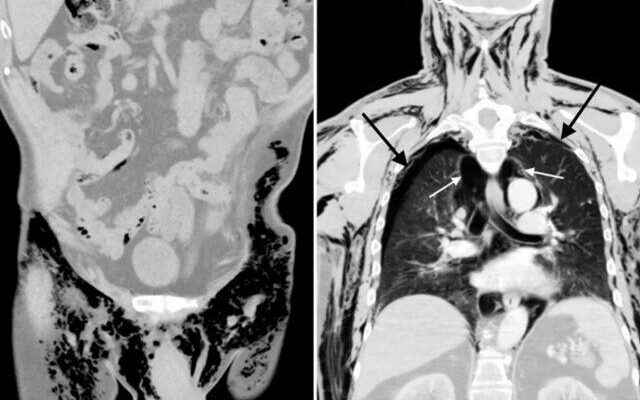An unidentified 72-year-old man living in Ohio was terrified by hissing sounds coming from his genitals. According to reports, the man, whose face was swollen and panting, was taken to the local emergency room complaining of his strange condition. An X-ray of the man’s chest revealed an “excessive” amount of air floating in his body, causing his lungs to collapse. Doctors reported that if left untreated, it could permanently damage heart and lung function and potentially lead to death. The unidentified man has been diagnosed as the first person in the world to have a “whistling scrotum.”
THE SOURCE OF THE Whistle: AN OPEN WOUND IN THE TEST
It was later discovered that the real source of the man’s strange whistling was an open wound on the left side of his scrotum. The injury, left over from testicular surgery five months ago to reduce swelling, allowed some of the trapped air to escape. Shortness of breath and swollen face also resulted from complications, the report said. Two plastic tubes were placed in his chest to drain excess air.
THEY HAVE TO REMOVE BOTH TESTS
Dr. Brant Bickford and colleagues wrote that he was transferred to another hospital for further treatment. His condition worsened as the amount of air trapped between his lungs and chest wall increased, forcing doctors to insert a new chest tube. Fortunately, the man’s lungs recovered after a three-day hospital stay, the study was recorded, and after recovery, the man was discharged from the hospital in good condition. Although no doctor could pinpoint the cause, they noted in the report that they had to remove both testicles before they could fix the problem. The study went on to explain that the pneumoscrotum was likely caused by penetrating injuries, resulting in trapped air.
WHAT IS PNEUMOSCROTUMA?

Pneumoscrotum is a rare condition in which air becomes trapped in the scrotum. Only 60 cases have been described in the medical literature. This air often requires medical attention, as air cannot escape through the body’s orifices.
